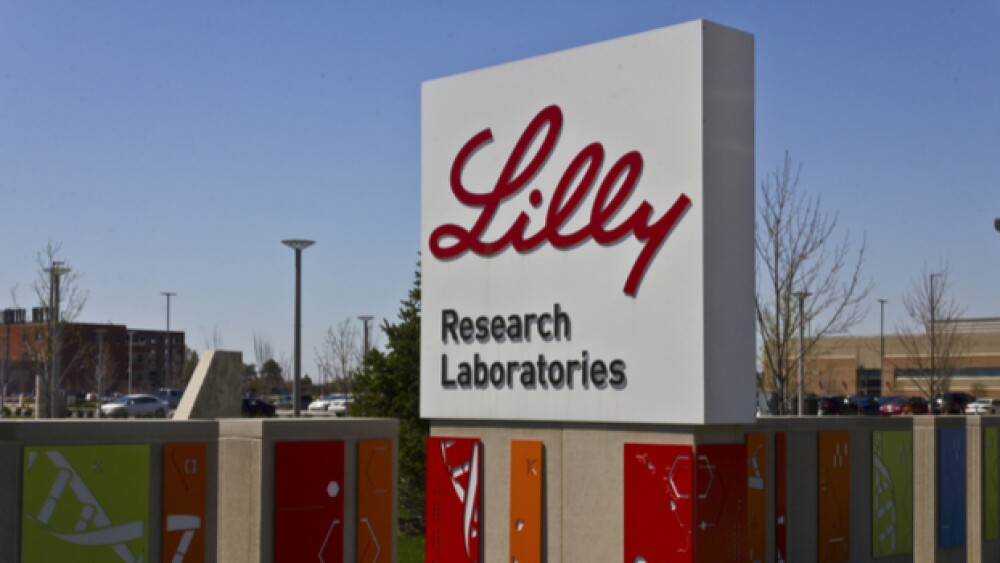Like many other big pharma companies, Eli Lilly & Co. reported a good 2018 with a less optimistic view of 2019. Fourth-quarter 2018 revenue grew by 5 percent, driven by newer drugs. Operating expenses also went up by a percentage point. Full-year 2018 revenue grew by 7 percent to $24.556 billion.
Jonathan Weiss / Shutterstock.com
Like many other big pharma companies, Eli Lilly and Company reported a good 2018 with a less optimistic view of 2019.
Fourth-quarter 2018 revenue grew by 5 percent, driven by newer drugs. Operating expenses also went up by a percentage point. Full-year 2018 revenue grew by 7 percent to $24.556 billion.
Pharmaceutical revenue for the fourth quarter grew 5 percent, driven by 11 percent growth in volume. Newer drugs were responsible for about 38 percent of pharmaceutical revenue. These included Trulicity, Taltz, Basaglar, Olumiant, Jardiance, Verzenio and Lartruvo.
Earnings per share (EPS) for the fourth quarter grew to $1.10 on a reported basis or $1.33 on a non-GAAP basis, with full-year EPS rising by $3.13 on a reported basis and $5.55 on a non-GAAP basis. However, Lilly dropped to 2019 EPS guidance range on a reported basis to $4.57 to $4.67 and on a non-GAAP basis to $5.55 to $5.65. They say this is largely related to its acquisition of Loxo Oncology and a negative Phase III confirmatory trial for Lartruvo.
On Jan. 18, Lilly released the results of its Phase III ANNOUNCE trial of Lartruvo in combination with doxorubicin in patients with advanced or metastatic soft tissue sarcoma (STS). The trial did not confirm a clinical benefit of the drug in combination compared to doxorubicin alone. It did not meet the primary endpoints of overall survival (OS) in the full study population or in the leiomyosarcoma (LMS) sub-population.
At the time, the company indicated it expected to incur a charge in the first quarter of 2019 related to Lartruvo in the range of $70 to $90 million.
Lilly plans to focus on new drugs and even more on the oncology market, particularly as some of its top-selling drugs such a Humalog for diabetes and Cialis for erectile dysfunction lose market share. The Lartruvo failure is a setback for the company’s efforts there. The drug gained accelerated approval in 2016 by the U.S. Food and Drug Administration (FDA), but continued approval was contingent on the results of the ANNOUNCE trial. As a result, the company is suspending promotion of the drug and it will no longer be prescribed to new patients in the U.S.
Also, the company noted that in its fourth quarter it abandoned a Phase II rheumatoid arthritis program for its BTK inhibitor LY3337641. Its collaboration partner Hanmi Pharmaceutical made a regulatory filing, stating they had chosen to discontinue the trial after interim data showed a lack of efficacy. The two companies had struck that deal in 2015 that had the potential to read $690 million. The companies were also planning to develop the drug for lupus, lupus nephritis, Sjogren’s syndrome, and other related conditions. Hanmi indicates it still expects to continue working on those indications.
Lilly says it is also cutting its Phase II diabetes drug DACRA-042 and a Phase I trial for Urocortin-2 PEPT for heart failure.
On a more positive note, the FDA granted approval for a new indication for Alimta (pemetrexed for injection) in combination with Keytruda and platinum chemotherapy for first-line treatment of metastatic nonsquamous non-small cell lung cancer, with no EGFR or ALK genomic tumor aberrations. The European Commission also approved Emgality for prophylaxis of migraine headaches in adults who have at least four migraine days per month.
“Lilly’s performance in the fourth quarter of 2018 capped an important year for the company, as we continued to launch new medicines, invest in our pipeline and deliver solid financial results,” stated David A. Ricks, Lilly’s chairman and chief executive officer.
He went on to say, “The portfolio of medicines that we have launched over the past five years is providing a strong foundation on which to grow our business, while the pending acquisition of Loxo Oncology is the latest example of our commitment to develop new medicines that will transform the care of many serious illnesses. We are determined to raise the bar even higher in 2019 so that more people around the world can benefit from Lilly medicines.”





